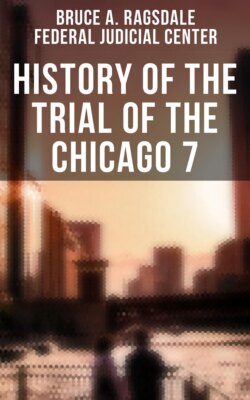Читать книгу History of the Trial of the Chicago 7 - Bruce A. Ragsdale - Страница 31
На сайте Литреса книга снята с продажи.
5. Were the defendants and their attorneys guilty of criminal contempt?
ОглавлениеTable of Contents
Judge Hoffman convicted the seven defendants and their two attorneys of 157 counts of criminal contempt. The U.S. Court of Appeals for the Seventh Circuit dismissed some of the charges against the attorneys and reversed all other convictions, which the appellate court sent back to the district court for retrial before a different judge. In the new trial, Judge Edward Gignoux found three of the defendants and one of their attorneys guilty of a combined total of thirteen contempts.
The U.S. court of appeals reversed all of the defendants’ contempt convictions and remanded them to the district court for retrial. The court of appeals dismissed some of the contempt convictions of attorneys Kunstler and Weinglass because their actions involved legitimate efforts to defend their clients; the remaining attorney convictions were remanded for new trials. The court of appeals also ruled that any defendant subject to more than six months’ imprisonment on the contempt charges would be entitled to a trial by jury.
The court of appeals cited recent Supreme Court decisions that restricted a district judge’s authority to issue contempt convictions at the conclusion of a trial if the allegedly contemptuous behavior involved personal insults that would likely create bias in the judge. By the time of the hearings on the Chicago Seven appeals, the government attorneys conceded that the defendants’ convictions should be retried before another judge in the district court, and the government’s decision to drop many of the charges eliminated the need for any jury trials.
Judge Edward Gignoux presided over the retrial of the fifty-two remaining contempt charges. Gignoux quickly dismissed two charges and acquitted the defendants of twenty-four others, including all of those pending against John Froines and Lee Weiner. Following a trial of more than four weeks, Gignoux’s decision on the remaining specifications rested on the criteria that the court of appeals had prescribed for determining guilt: the contemptuous behavior must have occurred in the court or close enough to obstruct the proceedings; the conduct must have violated the expected behavior in a courtroom; the individual must have intended to disrupt the court proceedings; and the conduct must have resulted in an obstruction of the courtroom.
Gignoux found David Dellinger guilty of seven contempt charges, most involving repeated insults directed at the judge while the jury was present. Jerry Rubin and Abbie Hoffman were found guilty of two charges each, including their appearance in the courtroom in judicial robes. William Kunstler was guilty of two contempt charges for extended attacks on the judge that resulted in a significant disruption in the courtroom. Gignoux imposed no jail time for any of the contempt convictions.
